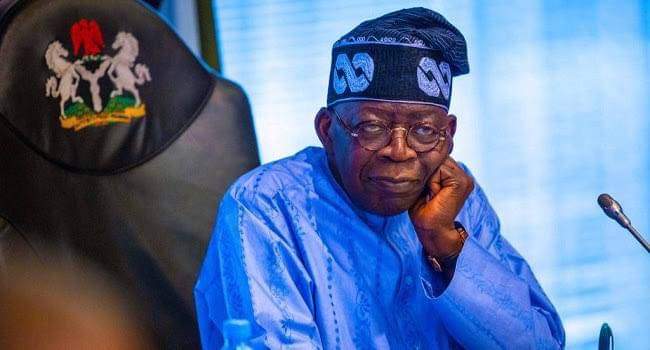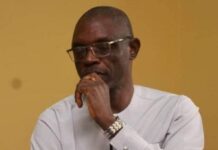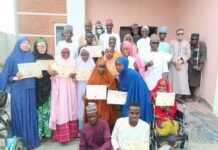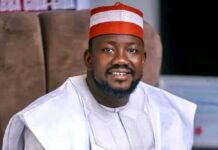Hunger Protest Treatise: Tinubu as Savvy Trumpeter
By Richard Elesho
“Everybody blow your trumpet” is a popular rendition in the church where I worship. Once the lead singer introduces the song, you find the eclectic congregation raising up their hands in unison with palms curved at the wrists around their mouths to blow an imaginary trumpet. After all, there is an old saying that if you dont blow your trumpet, no one will blow it for you.
Last Sunday, President Bola Ahmed Tinubu seemed to have moved the rhetoric a step further to blow his trumpet. I’ve indeed heard elsewhere that if you dont blow your trumpet, it could be stolen! That was a major takeaway from his nationwide broadcast in response to sporadic riots that broke out in parts of the country over skyrocketing costs of living.
In the last fortnight or so, the Nigerian nation has been tottering on the brink. Much as the state apparachik at different levels laboured to truncate a scheduled protest against hardship, youths in their numbers stormed the streets on Thursday August, 1, to demand an end to bad government.
Without any doubts, the *#EndBadGovernanceInNigeria* is an organised rebellion against and rejection of the pains and everything evil that government policies have inflicted on the masses.
Not even the usual lameduck refrain of blaming failed politicians as architects of the protests would dissuade the mob from their enterprise. Sadly, the demonstrations turned out to be treasonable and violent, claiming more than a dozen lives and property worth billions of Naira.
Speeches are a vital aspect of presidential communication. Thus, Nigerians watched with trepidation as hoodlums hijacked the protests, and they eagerly waited for what their president would say. Luckily, as against their experience in the recent past, they didn’t have to wait forever.
On Saturday, the third day of the protests, word circulated that the president would be addressing the nation the following day. The Sunday morning address has since received divergent reviews, with many people rating it as empty, below expectations, and widely off the mark.
A careful reading of the address will, however, reveal a mind in tune with the people and desperate to replace their fleeting despair with enduring hope. Come along, as we make a few references…
Throughout the duration of his address, Tinubu displayed the right emotional atmospherics. He was not aloof from the issues that have plagued the country. With a sombre spirit, he acknowledged the right of the protesters as “young Nigerians who desired a better and more progressive country where their dreams, hopes, and personal aspirations would be fulfilled.”
He was, however, unhappy that the protest led to the loss of lives, looting, and vandalization on a large scale, noting that the destruction of properties sets the nation way back as scarce resources will again be deployed to restore them.
The President commiserated with families of the deceased and, like a concerned father, appealed for a speedy end to further bloodshed, violence, and destruction.
The tone of a democrat that he sets from the beginning runs through the address. Contrary to claims by his traducers that Tinubu waved aside the demands of the protesters without addressing them headlong, he audibly invited them to the negotiation table.
“I hereby enjoin protesters and the organisers to suspend any further protest and create room for dialogue, which I have always acceded to at the slightest opportunity.
Nigeria requires all hands on deck and needs us all – regardless of age, party, tribe, religion, or other divides – to work together in reshaping our destiny as a nation.”
Read Also:
Far from the brush of dictatorship with which some have tarred him, President Tinubu, at the risk of sounding like a broken record, explained the inevitability of subsidy removal and abolition of multiple exchange rates. “These actions blocked the greed and the profits which smugglers and rent-seekers made.
They also blocked the undue subsidies we had extended to our neighbouring countries to the detriment of our people, rendering our economy prostrate. These decisions I made were necessary if we must reverse the decades of economic mismanagement that didn’t serve us well.
Yes, I agree, the buck stops on my table. But I can assure you that I am focused fully on delivering the governance to the people – good governance for that matter.”
Luckily, the initiatives have paid off, and the president literally proceeded to “blow his trumpet,” reeling out the positive signs in the economic health of the nation.
“In the past 14 months, our government has made significant strides in rebuilding the foundation of our economy to carry us into a future of plenty and abundance.
On the fiscal side, aggregate government revenues have more than doubled, hitting over *N9.1 trillion* in the first half of 2024 compared to the first half of 2023 due to our efforts at blocking leakages, introducing automation, and mobilising funding creatively without additional burden on the people.
Productivity is gradually increasing in the non-oil sector, reaching new levels and taking advantage of the opportunities in the current economic ambience.
Continuing, Tinubu said “My dear brothers and sisters, we have come from a place where our country spent *97%* of all our revenues on debt service; we have been able to reduce that to *68%* in the last 13 months.
We have also cleared legitimate outstanding foreign exchange obligations of about *$ 5* billion without any adverse impact on our programmes.” The president also highlighted other dividends of his policies.
They include infrastructure projects across the country, notably, the Lagos-Calabar Coastal Highway and the Sokoto-Badagry Highway, as well as inherited projects. There has also been notable increment oil production ratio and significant efforts on Compressed Natural Gas, (CNG) to power transportation.
Sequel to the latter, Tinubu disclosed that a million CNG kits of extremely low or no cost would be distributed to commercial vehicles.
The conversion kits are already being distributed and centres being set up across the country in conjunction with the private sector. On the Student’s Loan Scheme, the President said so far *N45.6 billion* has already been processed for payment to students and their respective institutions.
That is not all. He noted that he had equally directed the release of an additional N50 billion naira each for NELFUND – the student loan and Consumer Credit Corporation from the proceeds of crime recovered by the EFCC.
In addition, he said $620 million had been secured under the Digital and Creative Enterprises (IDiCE) – a programme to empower young people and make them globally competitive in Information Technology, (IT). Tinubu’s speech may not excite a casual reader. Sandwiched within it, however, are positives which attest to the sustained efforts of his government.
The new minimum wage law; the removal of tariffs on foods, and pharmaceuticals, and the various social reinvestment programs, are inalienable bright spots of the government’s endeavours thus far. Has the president’s address put an end to the countrywide protests? May be not yet. But, it has shed light on where we are and how the president’s renewed hope dream for Nigeria.
Richard Elesho is a Senior Editor with “The News” newspaper group













